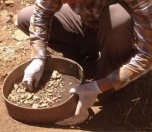* Photo: From the mass grave excavation in Çatak
Click to read the article in Turkish / Kurdish
The lawsuit filed by families to take the bones found in a mass grave in Van has been rejected by the Çatak Civil Court of Peace.
The families have been waging a legal struggle for 10 years so that they can take the bones and lay them to rest in a cemetery plot. Accordingly, they filed a lawsuit to take the bones of their relatives who were killed in a conflict in Görentaş Highland in Kayaboğazı village.
The court has rejected their request for taking the bones because they have not paid the "evidence advance" of 40,500 Turkish Lira (TRY). The bones will now be given to the Sub-Governor's Office.
Lawyer Turan Ece says that the bones given to the Sub-Governor's Office might be buried in a common grave.
Legal aid withdrawn for no reason
Lawyer Ece will appeal to the Court of Cassation against the ruling.
When the lawsuit was first filed, the families' request for financial aid was accepted; the court ruled that legal aid should be offered for the case.
However, though the families' financial standing had not changed during the trial, this ruling of legal aid was lifted before the case was concluded.
It was understood during the examination that the vast majority of the bones had been taken to the Fareşin highland before the examination on August 21, 2014. The rest of the bones will be handed over to the Sub-Governor's Office if the Court of Cassation upholds the ruling.
The bones are now in the forensic safe of the Çatak Courthouse.
Bones to be handed over to Sub-Governor's Office
The detailed ruling of the Çatak Civil Court of Peace dated April 20, 2021 has referred to the families' request for taking the bones following the DNA identification. According to this local court ruling, "as per national and international legislation, the court has the authority to decide to open the graves and to hand over the deceased bodies to the families."
The court has indicated that "the families requested DNA identification" on the bones and their submission to them.
However, as per the Article 10/c of the Regulation on Enforcing the Forensic Medicine Law, the court has ruled that the bones shall be handed over to the Sub-Governor's Office of Çatak district.
The court has said, "It is understood that ... 40,500 TRY, the total amount for the bone samples and 34 teeth samples that could be identified ... has not been deposited into the cash desk of the court."
Referring to the Article 324 of the Code of Civil Procedure (HMK), the court has indicated, "... [the applicants] were warned that unless the related evidence advance is not deposited into the cash desk of the court, they will be considered to give up basing upon the evidence in question..."
Accordingly, the court has considered that the families "have given up on the submission of the evidence," adding that "when the correspondence to the Çatak Chief Public Prosecutor's Office, Van Chief Public Prosecutor's Office, Van Provincial Gendarmerie Command, Çatak Municipality, Çatak District Gendarmerie Command and Beytüşşebap District Gendarmerie Command as well as the minutes, documents, evidence and statements collected as part of the entire file are considered, it has been understood that the request cannot be proven." The request has been rejected.
No identification by Forensic Medical Institution
The families first requested that the bones be sent to the İstanbul Forensic Medicine Institution for identification. The Forensic Medicine Institution sent back the bones without doing the requested identification. In response, the families said in 2015, "We want the bones of our children to be brought together." They demanded that all bones be buried in Fareşin.
Lawyer Ece says:
The court case filed by families for 'identification and submission' became a case for submission after 2015, when the state abstained from identification. The families' last request was not about identification or submission; it was solely about the delivery of the bones to them so that they could be brought together. I mean, we - the plaintiffs - have been demanding since 2015 that the bones kept in the forensic safe of the Çatak courthouse be taken to Fareşin to be brought together.
What happened?
In an armed conflict that erupted between the Turkish Armed Forces (TSK) and the Kurdistan Workers' Party (PKK) in Görentaş highland of Kayaboğazı village in Van's Çatak on October 12, 1998, 22 guerillas died according to official sources and 27 guerillas died according to the PKK. The bones of the guerrillas were not submitted to their families.
Hearing that a mass grave was found in Çatak in July 2011, the families applied to the Van Branch of the Human Rights Association (İHD), thinking that the bones might belong to their children.
Lawyers from the İHD applied to the Çatak Chief Public Prosecutor's Office and demanded that "the mass graves be opened by public means, DNA tests be done and the bones be submitted to the relatives."
In its decision dated August 24, 2011, the Çatak Chief Public Prosecutor's Office concluded that "there was no ground for prosecution in the name of the public" and "the requests fell within the jurisdiction of the civil court." The Erciş Heavy Penal Court upheld this decision.
Lawyer Turan Ece took the issue to the European Court of Human Rights (ECtHR). In a written correspondence dated March 20, 2013, the ECtHR asked whether the case file which was closed with a decision of non-prosecution was taken to the civil court or not.
Following this ECtHR judgement, lawyer Ece applied to the Çatak Civil Court of Peace on April 26, 2013. A lawsuit was filed at the Çatak Civil Court of Peace upon this application. (AS/SD)











